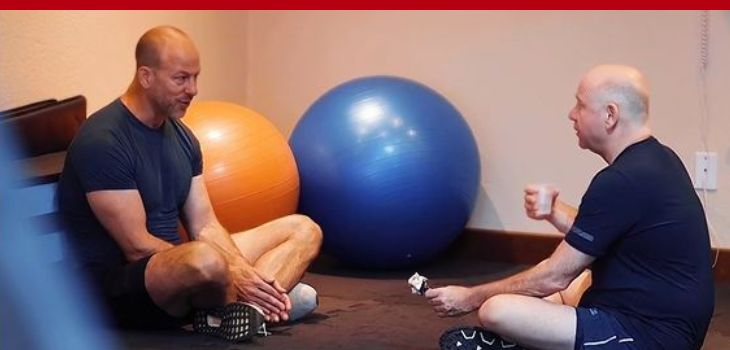by Ted Ryce
Ted Talk 198: What Your Doctor Is Not Telling You About Your Health
by Ted Ryce
by Ted Ryce
Ted Talk 198: What Your Doctor Is Not Telling You About Your Health
Ted Talk 198: What Your Doctor Is Not Telling You About Your Health
more
by Ted Ryce
Ted Talk 198: What Your Doctor Is Not Telling You About Your Health
Does this sound familiar?
You go into your doctor’s office because you’re over 40, your waistline is much bigger than it used to be, you’re not feeling as good as you used to feel, and you know there’s something up. And what do they do?
The doctor runs tests and delivers the verdict: “You’re fine.” Cholesterol’s a bit high, fasting glucose’s a touch elevated, but overall, you’re healthy, they say. But deep down, you don’t feel all that healthy.
In today’s Ted Talk episode, Ted will reveal what your doctor might not be telling you about your health.
He will talk about the importance of taking control of your health, understanding your body, and not settling for a vague diagnosis. Ted shares personal experiences and insights gained from his 24 years in the health industry.
You will find out why it’s crucial to dig deeper into your health when you don’t feel your best, and why relying solely on your doctor’s assessment might not be enough.
Listen now to learn how to assess your health beyond the surface, discover hidden health issues like non-alcoholic fatty liver disease, and take proactive steps towards a healthier, happier life.
You’ll learn:
- The role of BMI and waist circumference in assessing your health risks
- Understanding the significance of gamma glutamyl transpeptidase (GGT) as a marker
- How elevated ferritin levels can be a hidden indicator of health issues
- The link between fatty liver and symptoms like depression, fatigue, anxiety, and cognitive decline
- Why early detection of fatty liver is crucial for prevention and intervention
- The impact of visceral fat on overall health and well-being
- Why taking charge of your health and being proactive is essential, especially if you’re overweight or obese
- The specific populations with a lower genetic threshold for fatty liver
- The potential long-term consequences of ignoring hidden health issues
- How to use the fatty liver index calculator to assess your own risk
- The importance of self-care and self-love in the context of health and well-being
- And much more…
Related Episodes:
Ted Talk 185: 8 Health Metrics Men Over 40 Can’t Ignore
Ted Talk 182: Don’t Give Up On Yourself! A Guide To Thriving in Your Health Journey
Links Mentioned
Want some help building your best body ever?
Here are 3 ways I can assist whenever you’re ready.
1) Sign up for my Unstoppable After 40 Newsletter and get an email every Friday with tips and strategies on how to transform your body and reclaim your health in record time.
2) Want to learn the simple 5-step process my high achieving clients over 40 are using to skyrocket their energy and build younger, leaner bodies while enjoying life?
Watch my brand new Unstoppable After 40 Masterclass.
3) Work with my team and me directly to reclaim your health, lose fat, and get into the best shape of your life in 2023.
Marvel at the testimonials here first, then schedule your call.
Podcast Transcription: Help! Ted Talk 198: What Your Doctor Is Not Telling You About Your Health
Ted Ryce: So, let me know if this sounds familiar: You go into your doctor's office because you're over 40, your waistline is much bigger than it used to be, you're not feeling as good as you used to feel, and you know there's something up. And what do they do? They run some blood tests and then tell you, you know what, everything is fine. Maybe your cholesterol is a tiny bit high.
Maybe your fasting glucose isn't where it should be, but it's just a little bit high. But overall, you're pretty healthy. And you think to yourself, you know what? I don't feel that healthy. I mean, it's nice to hear that, but I don't feel that healthy. So today in this episode, I'm going to break down what your doctor isn't telling you about your health.
What is up, my friend? Welcome to the legendary life podcast. I'm your host, Ted Rice, health expert and coach to executives, entrepreneurs, and other high performing professionals. We produce this show for two reasons. Number one, I've been in this health business for 24 years. I've seen it all. I've seen the fads. I fell into the traps, and I've also struggled like what we're going to talk about today trying to get health information from my doctor when I really needed help. And he didn't have the answers.
And what I want to do is I want to bring you the best information on health, the best science-based information on health, along with adding my personal experience.
And the second reason is because if you're a high performer and you know the value of getting this handled once and for all, getting your health handled, especially if you're over 40, you're going to know that I'm the guy to help you.
So, let's dive into today's episode. I remember when I went to the doctor, and I was really struggling with some strange symptoms, and I had my blood work done, and my hemoglobin A1C was in the pre-diabetic range. My cholesterol was a little bit high, but I didn't have what you'd call a diagnosable disease. It was all what you would say is subclinical, but I felt terrible.
And I had a lot of anxiety. And this was, by the way, in my mid-thirties. If you've ever seen my fat photo, this is that time. And I was having these panic attacks. And my doctor just said, "Well, you've been through a lot in life."
Okay, and what do you do, man? Give me something actionable. That's not a diagnosis. There's no treatment plan. Do you know what you're talking about or not? I remember being so frustrated that I never wanted my clients, even though I decided not to go to medical school, I never wanted any of my clients to feel that way.
I wanted them to feel like, you know, if I have the answers, I'm happy to share it. But if I don't have the answers, I want to make it super clear to my clients what I know, what I don't.
So that they feel confident where they stand, and I'm not giving some BS answer like I was given. Now my doctor was okay, he was doing his best, but I have a much higher standard than that.
Now, what I want to talk about today is some of the situations I've been seeing with clients. I've been reading my clients' blood work for years, and I want to be clear. I'm not playing doctor. I don't diagnose or treat disease or anything like that. And if I do have an infection, like when I had COVID or when I needed a colonoscopy and had precancerous polyps cut out of my colon.
Actually, I don't think it was quite precancerous, but you know what I mean. It was a medical procedure.
I go to doctors and I appreciate them. But what I also appreciate is what their limitations are. Because what doctors, at least in my experience and from the experience of my clients, what they're looking for is, "Hey, you have liver cancer. We need to operate immediately or get you on chemo or give you some radiation.” Or “you have diabetes. We need to put you on metformin. We need to get you on all the drugs. We need to do all the things that a medical doctor would do to address a disease”.
And what they don't do a great job of - because well, quite frankly, so many of our physicians struggle with their health too - they don't do a great job of helping you achieve health. It's more about sick care than it is about healthcare.
And again, I just want to be clear, this isn't, I'm not hating on doctors. Now, some of you may hate doctors, and I don't think that's fair. That's not what we're going to talk about today, but I don't think it's fair.
But I also want to say that they don't always go as deep as they should. And I think the main thing here is standards. Like I was just saying, if you don't have a diagnosable, a clinical condition where they can, there's an established protocol to treat. What do they do? Tell you to go lose weight, eat fewer carbs and less saturated fat. Don't drink as much alcohol. That's about it. And.
That's all stuff you already know, and that's all stuff you sometimes do and you don't do.
So, what I've found by reading my clients' blood work more recently because if you missed the episode with my mentor, Dr. Brian Walsh, you want to go listen to that, it's episode 558, unlocking the secret to a healthier life with Dr. Brian Walsh. He's my mentor, and he's helping me to understand blood chemistry at a deeper level.
And as I said, I've been reading blood chemistries for years, looking at hormonal panels and other things. And of course, trying to understand like, okay, well what supplements and nutrition strategies and exercise strategies and other lifestyle interventions, what do we have evidence on that works to improve this particular set of markers?
And it's been okay, but Dr. Brian took me to the next level. In fact, I've caught things that my clients' doctors didn't catch. And I want to share a little bit about this. Because there is one thing in particular that you could almost say it's a hidden epidemic. And what am I talking about? Non-alcoholic fatty liver disease.
Now I'm going to do a whole episode on this because it's so important. It's underdiagnosed. According to the research, not me.
It's underdiagnosed, underappreciated, and it's at an epidemic level. In fact, 70% of obese people have fatty liver. So, if you're obese, and all you've got to do is, if you're not sure if you're obese or not, all you've got to do is go to Google or whatever, DuckDuckGo or whatever search engine, put in your height, your weight, and BMI, and then click search, and just click on one of the search results, and it will give you your BMI.
Or you can Google BMI calculator and put all the numbers in that it asks for, and it will give you, it will tell you exactly where you're at. If you're normal weight, underweight, overweight, or obese.
So, 70% of people who are obese have this fatty liver, and even people who are overweight or even normal weight have problems with fatty liver as well. And so, I want to talk about a couple of clients who came in and they got a clean bill of health from their doctor.
And in one case, I said, hey, let's do some more advanced, more advanced biomarker testing because I feel like it wasn't comprehensive enough, what the tests that their doctor's, that this person's, this client's doctor ran.
And then in the second case, he's a CEO, and he did a full executive health panel. And this same marker came really high. And the marker is something called ferritin. And really interesting in the case of my CEO client, the ferritin marker was high. And what they said in the explanation of it is like, well, he doesn't have an iron deficiency.
It's like, okay, but why is it so elevated? Because if you look at the actual research on elevated ferritin levels, which I ended up looking up anything above 300 milligrams per deciliter. Or I'm sorry. I think I'm messing those. I think I'm messing that up. milligrams per milliliter. I believe. So, anything beyond that, it's an issue.
Let me look it up for you. So, the issue is that anything greater than 200 nanograms per milliliter in women and anything greater than 300 nanograms per milliliter in men, it's abnormal. And both of these clients came back with a ferritin level of about 400.
Now in some cases, people have elevated ferritin levels, which it's a marker of iron, but it's also a marker of acute inflammation. So, some people have elevated ferritin levels because they're experiencing iron overload, most likely because, and again, this isn't me saying this, this is what the literature says, hemochromatosis.
So, they have a genetic disorder. If you don't know what hemochromatosis is, it's a genetic disorder where you have high iron levels. And it's a big issue because iron is necessary for life, but if you have too much of it, it destroys your organs. It's very important to not have too much iron. It's very important to have enough iron, but not too much.
But what was interesting about both these people is that the iron levels seem normal, but their ferritin levels were abnormal. And when I looked up what causes elevated ferritin levels, what I found was in a large population of people of different ethnicities, the most common causes of elevated ferritin levels are obesity, inflammation, and daily alcohol consumption.
And what was also really interesting was both of these clients had elevated liver markers. So, AST and ALT, I'm not going to go into what that is, but these elevated liver markers. And so, it's like, okay, well, there's high ferritin, there's these elevated liver markers and this is an issue. What's causing it? Is it some fatty liver?
Because fatty liver, if you don't know much about it, we used to think it was only, or I should say we, I should say scientists used to think it was only alcoholics that got it. So, people who drank themselves to death, basically, they would drink, it would destroy their liver, and they'd come down with these fatty deposits, and it would eventually become cirrhotic. So, the liver tissue would become cirrhotic.
The liver stops working and comes an issue. And then what they found out is it's not just alcoholics that have it. That's why they started to call it non-alcoholic fatty liver disease. And what is it caused by? Some folks drink some folks don't, but it's caused by obesity.
And more specifically, if you've ever heard of visceral fat and visceral fat is the big issue, and the subcutaneous fat that's the fat underneath your skin is maybe something you don't like the sight of. You're like, oh, I have too much fat, but the visceral fat is underneath. It's inside your organs. As an example, in your liver can be in other places too, like your heart, pancreas, and other places, but we're talking about the liver right now, because what's really interesting about fatty liver is it's underdiagnosed.
I'm not going to get into all the reasons why that is but it's a little bit tricky to spot. Doctors aren't necessarily looking at evidence-based. What would you say? There's some tests that you can run and I'm going to even share one with you here that you can go Google yourself. And you can see what your risk is for fatty liver, but a lot of doctors aren't running this particular lab. And I'll tell you what it is a bit later.
And what I want to tell you is this is a huge issue because listen to this. These are some of the symptoms of fatty liver: Depression, either clinical or subclinical. Fatigue, anxiety, chronic pain, cognitive decline. In other words, senior moments.
So, and this is being missed on normal blood labs. By the way, they stopped calling or, the update to the name, non-alcoholic fatty liver disease is now being suggested that we should call it metabolic associated fatty liver disease, because this is another one of the issues of metabolic syndrome and let me tell you something.
If you're a person who you're suffering from bouts of depression and it's not, you're not so depressed that you can't go to work or you need to get on medication, but you just feel a bit down or maybe a bit anxious and, you know, you eat healthy and you exercise and do some other things, but you're just a bit carry around a bit more body fat.
And you've been told by your doctor that you're fine and you just kind of think, well, maybe I have some psychological problems. But guess what? If this is being caused by fatty liver, then no amount of therapy, or even if you go the route of antidepressants, is going to make a difference.
At least not going to address the root cause might make you feel better but it'll always come back. Huge issue or fatigue.
So, I'm starting to see this a lot with clients, especially my obese clients, and even some that are not obese, some that are overweight or even normal weight. And so, you might say, well, how do you know that? Great question. Because as I'm, as I'm saying to you here, there are, there's a calculator that I'm going to share with you right now called “the fatty liver index” that you can go and use to give you an idea of your risk for having a fatty liver.
And this is something that you can do on your own. And it's something that, honestly, if you're overweight or obese, your doctor should be doing this for you, at least be talking about this with you. And one of the things that I've, I just need to say this, I just need to get this off my chest.
It's also one of the things it's like, we're in this society today where it's like, love yourself and let's accept ourselves, fat acceptance. And I do think that's important. I really don't think that calling yourself a fat loser if you're overweight or obese is going to help you. Now, if it does, go for it. But for a lot of people, it just makes them feel bad. And you know what, I'm fat and I'm a fat loser and I'm just going to eat more because, you know, I keep trying to exercise, but it doesn't work for me or keep trying to eat right, but it doesn't work for me.
And so, I think the fat acceptance, I think accepting yourself and self-love is really important. And I think that being honest about the health consequences of excessive body fat is also a form of self-care and also really important to talk about.
So, the fatty liver index, let me talk a little bit about it. So, it's based on four different metrics. Number one is your BMI, which again, you can Google BMI calculator, type in your height, your weight, and it will give you your BMI. The second one is your waist circumference.
And that is you measure a waist around the belly button and you don't suck in. No cheating. And then there's a marker called GGT. And it's called gamma-glutamyl transpeptidase, which is really interesting because I rarely see this marker on blood tests. Now I run it for my clients when I say, hey, listen, these are the tests that I want to see. So please take these tests. And then I run it, but I, I have not seen it yet on anyone's blood chemistry, even the CEO that came to me recently with an extensive workup with biomarkers from his health.
And he was saying, Oh, I'd be curious. I take a really comprehensive executive health, um, you know, exam and they run a lot of tests. So, BMI, waist circumference, GGT, gamma-glutamyl transpeptidase, and triglycerides. Triglycerides are going to be on pretty much every blood chemistry where they test your lipids.
So, with those things, those markers, you can Google fatty liver index, and this is what I'm doing with my clients by the way, I get this information after I had the GGT and their waist circumference and triglycerides, and I just put in the numbers.
Now really important, this fatty liver index, this is, there's a ton of research on this. In fact, if you Google fatty liver index calculator, what comes up is a calculator. And if you scroll down a bit and click on the evidence, it actually leads you to papers that if you're so inclined, you can, you can read up on this.
And so, there's quite a few papers done on it. Why isn't it being done with doctors when you go to your doctor, especially if you're overweight or obese? Well, look, I'm not going to get into that conversation, but it's basically, it's the business of medicine. Their standards are low. They don't have a lot of time for you. They're doing the best that they can. I really honestly believe that.
And here's the other thing. I just want to slap this in there in case you don't like the fact that I'm, uh, defending doctors how comfortable are you? Now, you'll probably pay 40, 50, $100,000 for a car, you'll pay a million dollars for a house, how comfortable are you paying a few hundred dollars or a thousand dollars for something for your health?
If you're like most people, unfortunately, the mentality of our society, we want insurance to cover everything. We don't want to pay out of pocket. It's one of the biggest, thankfully for me, I have a very small, very small coaching business, so I'm almost completely booked with one-on-one clients at least.
My group I still have several like half full, but I'm almost completely booked with one-on-one clients. But I could only imagine trying to run a bigger business. I mean, doctors need to make things happen. They only have a certain amount of time and clients don't want to pay extra for this.
So, anyway, what you can do is google fatty liver index calculator, you can get these metrics, your BMI, waist circumference, GGT, and triglycerides. And really the only thing that you'll have to ask for is GGT, and you can totally ask for that on your next blood chemistry, and you can put this in and figure out your risk for fatty liver.
And again, it's not a diagnosis, it's a risk. So, there's low risk, indeterminate risk. So, it's neither ruled in or ruled out or high risk. In fact, they're like, "Oh, we're pretty sure you have fatty liver. Pretty, pretty sure most likely you have fatty liver." This is something you should be doing for yourself because your doctor's not going to do it. And if your doctor is doing it and I'm wrong, well, fantastic, stay with that doctor, they're doing a great job for you.
But if not, if this is the first time you're hearing some of this stuff, you want to take this into your own hands. You want to be more on top of this. And I'll tell you, they're not running, in general. Generally speaking.
Now, there's some doctors who are amazing. I know there are. But in general, if your doctor is, you know, a bit busy and he's got a lot of patients and he may not be read up on the latest information, because I'll tell you something, I make sure that I have time for mentorship, for learning, for reading more research, for getting better at this, but a lot of people, they care more about money. And I care about money too, I'm not saying that. I want to make as much money as I can.
But I'm not going to, there's certain things I won't sacrifice and I need to learn, I need to get better. But a lot of doctors, especially if they're in the insurance model, it must be very difficult. So that's what I have to say for you right now. You got to take health into your own hands. Your average doctor isn't doing a great job in terms of, they're doing a great job looking for, okay, is this person about to...
Do they have a clinical disease that needs treatment right away or on the verge of needing treatment right away? Okay, great. But if we're talking about health, you've got to switch your mindset.
You either have to hire someone like myself, doesn't have to be me, but someone equally as qualified because you don't want to have some goofball doing this for you, and or you need to take it into your own hands and spend the time getting on top of this, especially if you're overweight or obese. You are not healthy if that's the case, not physiologically. Now you may have healthy relationships, fantastic.
There's a lot of lean people that don't have healthy relationships. You may be healthy psychologically for the most part, right? We all have our issues and that's great, but physiologically, you're not healthy and you're on your way to having something. It's just a matter of what is that something going to be and when is it going to happen?
Because we all reach a threshold with how much fat we can handle on our body. In fact, there's one more thing I got to say here. If you are East Asian. So Korean, Chinese, Japanese, or South Asian, Indian from Bangladesh, Pakistani, et cetera, or Hispanic.
So, from South America or the Caribbean, you have a lower genetic threshold for fatty liver. In fact, I spoke to someone the other day, he didn't unfortunately become a client, but he has fatty liver. And here's the other thing with fatty liver, it keeps progressing and it's reversible. But once it gets cirotic, once it gets to a certain point, you're done.
You're done. And what do I mean by done? Well, most people die from cancer or heart disease. And so, this is a risk factor for both of those things. It's not just about your apple lip or protein B levels, or your cholesterol levels, or the other markers of heart health. So please take this seriously. And when you get a clear bill of health, even though you're having some symptoms and your waistline is quite large, go a step beyond.
Don't just accept that you're okay and that's it. Because most likely you're okay right now because you don't have a clinical disease but you're on your way to getting one.
So that is it for me today. I hope you learned a lot from this. I'm going to be talking much more about this and the other thing that I want to say here is that if you're interested in having me work with you to improve your health, to lose the fat in a sustainable way and help you optimize your health for the long term go to LegendaryLifeProgram.com/apply .
And I want to be clear here, my program is for executives, entrepreneurs, and other high-performing professionals. If that isn't you, and if you're not really committed to handling your health, this isn't for you.
There's other programs out there that are better suited. But if you're a busy executive entrepreneur or attorney, et cetera, some type of professional, like that, consultant, doctor, go to LegendaryLifeProgram.com/apply and book a call with me.
Then we can hop on a call, talk more about what's going on with you, what your goals are, what you feel like is in your way, and we can make the decision whether what I do is right for you and if you're the type of client that I feel I can help as well. All right. Hope you learned a lot and I would ask you.
What is something you learned today that you can go and take action on? What is something you learned today that you can go and take action on? That's what I want to challenge you with. Have an amazing weekend and speak to you on Monday.
Sign up to receive email updates
Enter your name and email address below and I'll send you periodic updates about the podcast.









